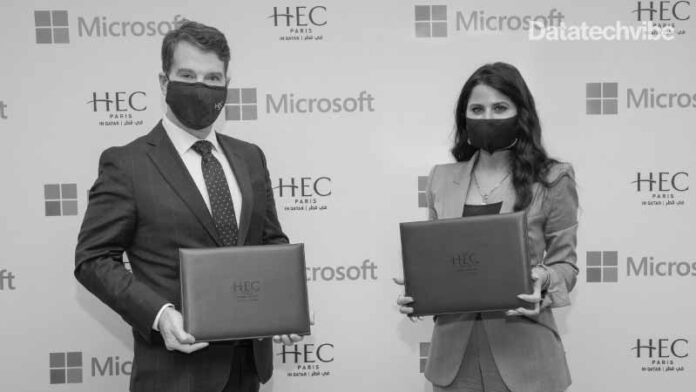As part of its efforts to increase Qatar’s competitiveness and build the digital capabilities of the country’s current and future workforce, Microsoft partnered with HEC Paris, Europe’s top-ranked business school, to deliver executive education in digital transformation to public and private sector leaders.
The partnership comes in line with Microsoft’s commitment to accelerate Qatar National Vision 2030 through the skilling, upskilling and reskilling of the workforce in an increasingly knowledge-based economy and can fully harness the unlimited potential of the upcoming Microsoft Cloud data centre region. To this end, Microsoft has launched a nationwide skilling initiative to train over 50,000 individuals in the cloud and AI technologies over the next five years.
Also Read: Holistic IoT Security Can No Longer Be Overlooked
“This collaboration goes a long way in building talents, supporting digital transformation, and building the platform from which we support the growth of a knowledge-based and diversified economy that is at the heart of Qatar National Vision 2030,” said Professor Pablo Martin de Holan, Dean of HEC Paris in Qatar.
Lana Khalaf, Microsoft’s Country Manager in Qatar, said, “Realising human potential is at the centre of our efforts to accelerate digital transformation and a knowledge-based economy in Qatar. We are committed to fostering a culture of tech intensity amongst business leaders so they can lead ground-breaking innovations, industry transformation and drive economic growth across the country’s vital industries. Our partnership with HEC Paris will support the development of talents through leadership skills needed to succeed in today’s cloud- and AI-enabled world.”
The MoU announced activities tailored to enable leaders in Qatar to achieve more with a focus on Qatari and female leaders’ participation. The first cohort will engage several business communities to enrich their development and participate in public forums.
As per a study by the International Data Corporation, the global technology leader can expect its new Cloud ecosystem to generate more than 24,000 jobs by 2024, outlining an existing digital skills gap that must be covered alongside other key economic investments in Qatar. Microsoft’s commitment to skilling has seen the global technology leader partner with organisations from across the country in both public and private sectors to create programs that help better align workforce demand with the supply of talent across a curriculum covering everything from jobs requiring basic technology skills to AI-developers.









